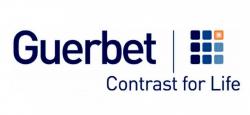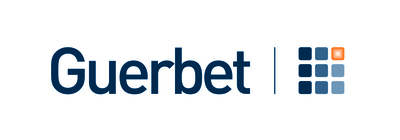Guerbet To Showcase Innovative Diagnostic and Interventional Imaging Solutions at RSNA 2018
New and Next-Level Management Products Available for Demonstration in Interactive Workstations
Congratulates Avner Meoded, MD, Johns Hopkins University, as recipient of the Guerbet/RSNA Research Scholar Grant
PRINCETON, N.J., Nov. 26, 2018 /PRNewswire/ -- Guerbet LLC USA, the U.S. affiliate of the global specialist in contrast media products and comprehensive end-to-end solutions for medical imaging, will highlight new and next-level product offerings and partnerships in contrast media, injectors, disposables, digital solutions, and services at the 2018 annual meeting of the Radiological Society of North America (RSNA) in Chicago, Illinois.
At Guerbet's booth 2558, interactive workstations will provide live demonstrations of novel clinical tools for diagnostic and interventional imaging, including:
- Contrast & Care®, a next-level contrast media injection management solution that enables imaging centers to collect, archive, examine and share data directly with Guerbet's injectors to help radiologists with patient care, and;
- Imalogix, a new self-learning neural network that enables organizations to understand and benchmark best practices from the mass learnings in real time, across a network of providers to drive continuous improvement.
Guerbet will also highlight additional key milestones achieved this year, including:
- Product launches:
- SeQure® and DraKon™, two novel microcatheters for tumor and vascular aneurysm embolization procedures
- L-F Hydra Vision™ Digital Imaging System, a real-time digital X-ray imaging device in urological imaging
- Partnership:
- Joined forces with the Association for Medical Imaging Management (AHRA) "Defining Our Future" campaign, an initiative to support the education, development, and empowerment of new and future medical imaging professionals.
Guerbet's macrocyclic ionic contrast agent Dotarem (gadoterate meglumine) remains the first and only macrocyclic & ionic GBCA molecule approved by the FDA, recently surpassing its 85 millionth dose worldwide. Celebrating the five-year anniversary of Dotarem's U.S. launch in March 2013 (and its first pediatric and adult injections in July and September 2013 respectively), all on the heels of Dotarem's "under age 2" pediatric approval last September, Guerbet continues to grow its success story and make positive impacts in the field.
Guerbet also proudly celebrates the granting of the Guerbet/RSNA Research Scholar Grant, by the RSNA Research & Education Foundation to Avener Meoded, MD, of Johns Hopkins University. The $150,000 two-year grant will help fund Dr. Meoded's research using a comprehensive "omics" approach in the study of brain neuroplasticity in pediatric arterial ischemic stroke.
"Guerbet is proud to support a grantee seeking to make advances in pediatric brain neuroplasticity and enhance medical research," said Massimo Carrara, Guerbet Vice President for North America. "It is an area in which we look forward to expanding as we continue to grow."
To learn more, visit Guerbet at RSNA booth 2558, or www.guerbet-us.com/rsna2018.
About Guerbet
Guerbet is a pioneer in the contrast-agent field, with more than 90 years' experience, and is a leader in medical imaging worldwide. It offers a comprehensive range of pharmaceutical products, medical devices and services for diagnostic and interventional imaging, to improve the diagnosis and treatment of patients. With 8% of revenue dedicated to R&D and more than 200 employees distributed amongst its four centers in France, Israel and the United States, Guerbet is a substantial investor in research and innovation. Guerbet (GBT) is listed on Euronext Paris (segment B – mid caps) and generated €807 million in revenue in 2017. For more information about Guerbet, please visit www.guerbet.com
Important Safety Information for Dotarem (gadoterate meglumine)
|
WARNING: NEPHROGENIC SYSTEMIC FIBROSIS (NSF)
Gadolinium-based contrast agents (GBCAs) increase the risk for NSF among patients with impaired elimination of the drugs. Avoid use of GBCAs in these patients unless the diagnostic information is essential and not available with non-contrasted MRI or other modalities. NSF may result in fatal or debilitating fibrosis affecting the skin, muscle and internal organs.
- The risk for NSF appears highest among patients with:
- Chronic, severe kidney disease (GFR < 30 mL/min/1.73m2), or
- Acute kidney injury.
- Screen patients for acute kidney injury and other conditions that may reduce renal function. For patients at risk for chronically reduced renal function (e.g. age > 60 years, hypertension, diabetes), estimate the glomerular filtration rate (GFR) through laboratory testing.
- For patients at highest risk for NSF, do not exceed the recommended DOTAREM dose and allow a sufficient period of time for elimination of the drug from the body prior to any re-administration.
|
Indications and Usage
DOTAREM® (gadoterate meglumine) injection is a prescription gadolinium-based contrast agent indicated for intravenous use with magnetic resonance imaging (MRI) in brain (intracranial), spine and associated tissues in adult and pediatric patients (including term neonates) to detect and visualize areas with disruption of the blood brain barrier (BBB) and/or abnormal vascularity.
Contraindications
History of clinically important hypersensitivity reactions to DOTAREM.
Warnings and Precautions
- Hypersensitivity Reactions: Anaphylactic and anaphylactoid reactions have been reported with DOTAREM, involving cardiovascular, respiratory, and/or cutaneous manifestations. Some patients experienced circulatory collapse and died. In most cases, initial symptoms occurred within minutes of DOTAREM administration and resolved with prompt emergency treatment.
- Before DOTAREM administration, assess all patients for any history of a reaction to contrast media, bronchial asthma and/or allergic disorders. These patients may have an increased risk for a hypersensitivity reaction to DOTAREM.
- Administer DOTAREM only in situations where trained personnel and therapies are promptly available for the treatment of hypersensitivity reactions, including personnel trained in resuscitation.
- Gadolinium Retention: Gadolinium is retained for months or years in several organs. The highest concentrations have been identified in the bone, followed by brain, skin, kidney, liver and spleen. The duration of retention also varies by tissue, and is longest in bone. Linear GBCAs cause more retention than macrocyclic GBCAs.
- Consequences of gadolinium retention in the brain have not been established. Adverse events involving multiple organ systems have been reported in patients with normal renal function without an established causal link to gadolinium retention.
- Acute Kidney Injury: In patients with chronically reduced renal function, acute kidney injury requiring dialysis has occurred with the use of GBCAs. The risk of acute kidney injury may increase with increasing dose of the contrast agent; administer the lowest dose necessary for adequate imaging.
- Extravasation and Injection Site Reactions: Ensure catheter and venous patency before the injection of DOTAREM. Extravasation into tissues during DOTAREM administration may result in tissue irritation.
Adverse Reactions
- The most common adverse reactions associated with DOTAREM in clinical trials were nausea, headache, injection site pain, injection site coldness and rash.
- Serious adverse reactions in the Postmarketing experience have been reported with DOTAREM. These serious adverse reactions include but are not limited to: arrhythmia, cardiac arrest, respiratory arrest, pharyngeal edema, laryngospasm, bronchospasm, coma and convulsion.
Use in Specific Populations
- Pregnancy: GBCAs cross the human placenta and result in fetal exposure and gadolinium retention. Use only if imaging is essential during pregnancy and cannot be delayed.
- Lactation: There are no data on the presence of gadoterate in human milk, the effects on the breastfed infant, or the effects on milk production. However, published lactation data on other GBCAs indicate that 0.01 to 0.04% of the maternal gadolinium dose is present in breast milk.
- Pediatric Use: The safety and efficacy of DOTAREM at a single dose of 0.1 mmol/kg has been established in pediatric patients from birth (term neonates ≥ 37 weeks gestational age) to 17 years of age based on clinical data. The safety of DOTAREM has not been established in preterm neonates. No cases of NSF associated with DOTAREM or any other GBCA have been identified in pediatric patients age 6 years and younger.
You are encouraged to report negative side effects of prescription drugs to the FDA. Visit www.fda.gov/medwatch or call 1-800-FDA-1088.
SOURCE Guerbet LLC USA

For further information: Guerbet U.S., Audrey Wallendal, (609) 683-0700, awallendal@taftcommunications.com




